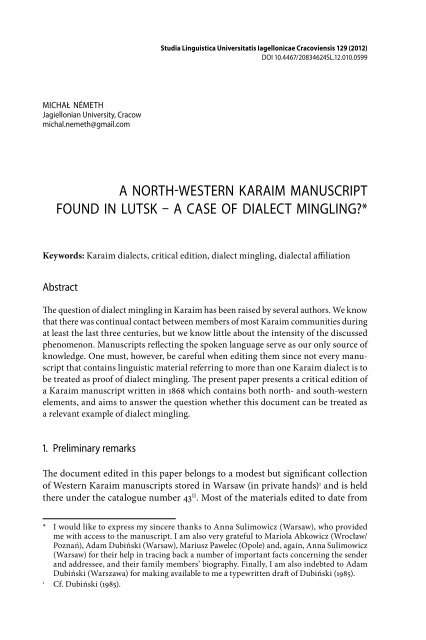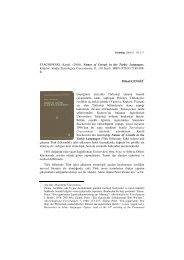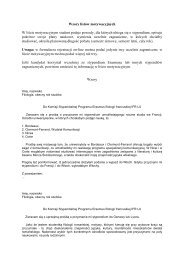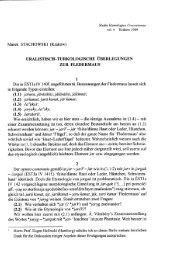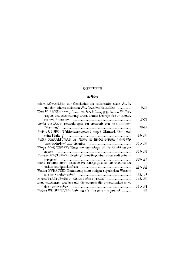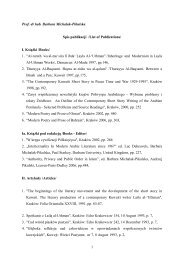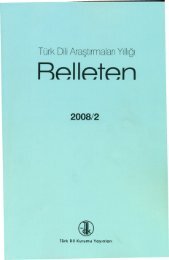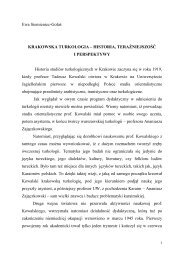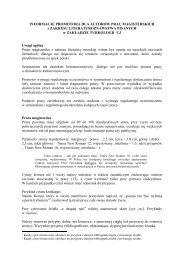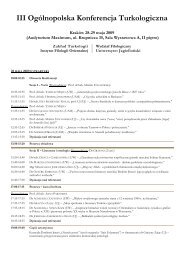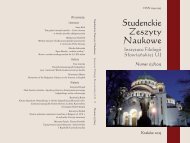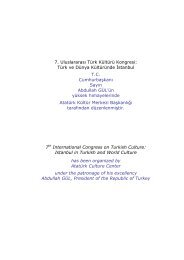a north-western karaim manuscript found in lutsk – a case of dialect ...
a north-western karaim manuscript found in lutsk – a case of dialect ...
a north-western karaim manuscript found in lutsk – a case of dialect ...
Create successful ePaper yourself
Turn your PDF publications into a flip-book with our unique Google optimized e-Paper software.
Studia L<strong>in</strong>guistica Universitatis Iagellonicae Cracoviensis 129 (2012)DOI 10.4467/20834624SL.12.010.0599MICHAŁ NÉMETHJagiellonian University, Cracowmichal.nemeth@gmail.comA NORTH-WESTERN KARAIM MANUSCRIPTFOUND IN LUTSK – A CASE OF DIALECT MINGLING?*Keywords: Karaim <strong>dialect</strong>s, critical edition, <strong>dialect</strong> m<strong>in</strong>gl<strong>in</strong>g, <strong>dialect</strong>al affiliationAbstractThe question <strong>of</strong> <strong>dialect</strong> m<strong>in</strong>gl<strong>in</strong>g <strong>in</strong> Karaim has been raised by several authors. We knowthat there was cont<strong>in</strong>ual contact between members <strong>of</strong> most Karaim communities dur<strong>in</strong>gat least the last three centuries, but we know little about the <strong>in</strong>tensity <strong>of</strong> the discussedphenomenon. Manuscripts reflect<strong>in</strong>g the spoken language serve as our only source <strong>of</strong>knowledge. One must, however, be careful when edit<strong>in</strong>g them s<strong>in</strong>ce not every <strong>manuscript</strong>that conta<strong>in</strong>s l<strong>in</strong>guistic material referr<strong>in</strong>g to more than one Karaim <strong>dialect</strong> is tobe treated as pro<strong>of</strong> <strong>of</strong> <strong>dialect</strong> m<strong>in</strong>gl<strong>in</strong>g. The present paper presents a critical edition <strong>of</strong>a Karaim <strong>manuscript</strong> written <strong>in</strong> 1868 which conta<strong>in</strong>s both <strong>north</strong>- and south-<strong>western</strong>elements, and aims to answer the question whether this document can be treated asa relevant example <strong>of</strong> <strong>dialect</strong> m<strong>in</strong>gl<strong>in</strong>g.1. Prelim<strong>in</strong>ary remarks**The document edited <strong>in</strong> this paper belongs to a modest but significant collection<strong>of</strong> Western Karaim <strong>manuscript</strong>s stored <strong>in</strong> Warsaw (<strong>in</strong> private hands) 1 and is heldthere under the catalogue number 43 II . Most <strong>of</strong> the materials edited to date from* I would like to express my s<strong>in</strong>cere thanks to Anna Sulimowicz (Warsaw), who providedme with access to the <strong>manuscript</strong>. I am also very grateful to Mariola Abkowicz (Wrocław/Poz nań), Adam Dubiński (Warsaw), Mariusz Pawelec (Opole) and, aga<strong>in</strong>, Anna Sulimowicz(Warsaw) for their help <strong>in</strong> trac<strong>in</strong>g back a number <strong>of</strong> important facts concern<strong>in</strong>g the senderand addressee, and their family members’ biography. F<strong>in</strong>ally, I am also <strong>in</strong>debted to AdamDubiński (Warszawa) for mak<strong>in</strong>g available to me a typewritten draft <strong>of</strong> Dubiński (1985).1Cf. Dubiński (1985).
140 MICHAŁ NÉMETHthis collection (<strong>in</strong> Németh 2010 and 2011) were written exclusively <strong>in</strong> south-<strong>western</strong>Karaim. The only exception <strong>in</strong> this group <strong>of</strong> <strong>manuscript</strong>s is the document analysed<strong>in</strong> Németh (2010), <strong>in</strong> which we f<strong>in</strong>d four fragments written <strong>in</strong> two <strong>dialect</strong>s: two paragraphs<strong>in</strong> south-<strong>western</strong> Karaim and the other two <strong>in</strong> the <strong>north</strong>-<strong>western</strong> <strong>dialect</strong>with eastern Karaim elements. All these paragraphs are the work <strong>of</strong> four differentand unknown authors.Similarly to the document mentioned above, the text presented <strong>in</strong> this paperexhibits some <strong>in</strong>stances <strong>of</strong> <strong>dialect</strong> m<strong>in</strong>gl<strong>in</strong>g – it conta<strong>in</strong>s a number <strong>of</strong> evident south<strong>western</strong>features even though it was written by a <strong>north</strong>-<strong>western</strong> Karaim speaker.Fortunately, we know the identity <strong>of</strong> the author as he signed the document. The <strong>manuscript</strong>is a private letter.What makes the above somewhat more complex is that Mardkowicz (1933: 7–8)published a transcription <strong>of</strong> the present <strong>manuscript</strong> <strong>in</strong> which he altered most <strong>of</strong>the <strong>north</strong>-<strong>western</strong> Karaim characteristics <strong>in</strong> such a way to appear as if they hadbeen written <strong>in</strong> his native south-<strong>western</strong> <strong>dialect</strong>. In our commentaries attachedto the l<strong>in</strong>guistic material we have therefore additionally made a comparison betweenthe orig<strong>in</strong>al <strong>manuscript</strong> and Mardkowicz’s edition (letter III <strong>in</strong> his article).Mardkowicz’s decision to alter the l<strong>in</strong>guistic features <strong>of</strong> the <strong>manuscript</strong>s heread should be expla<strong>in</strong>ed as an attempt to compile exemplary l<strong>in</strong>guistic materialas a model to be followed by what was then a new generation <strong>of</strong> Karaim speakers.In Németh (2009) we presented a detailed description <strong>of</strong> this practice and <strong>in</strong>terpretedit as a key aspect <strong>of</strong> the Karaim language purism movement characteristic<strong>of</strong> the <strong>in</strong>terwar period.2. General description <strong>of</strong> the <strong>manuscript</strong>The cream-coloured sheet is folded <strong>in</strong>to two halves and thus consists <strong>of</strong> four pages.The letter itself is written on the first two 175 × 220 mm pages <strong>in</strong> Karaim semicursivescript (based on Hebrew script). The text <strong>of</strong> the letter is partly vocalised,clearly legible, written <strong>in</strong> light grey <strong>in</strong>k and <strong>in</strong> one hand. It was composed <strong>in</strong> Odessaon 17 July 1868, i.e. 29 July 1868 accord<strong>in</strong>g to the Gregorian calendar.3. The author’s and the addressee’s identitiesUnlike some <strong>of</strong> the other Karaim letters written <strong>in</strong> the same period as the one currentlybe<strong>in</strong>g edited, we know the exact name <strong>of</strong> the author. He is Jehoszafat son <strong>of</strong>Zacharja Kapłanowski, 2 a citizen <strong>of</strong> Odessa at the time the letter was written. He wasborn <strong>in</strong> Trakai around 1813, and died probably <strong>in</strong> Odessa after 1886 (see below).2We have cited the personal names <strong>of</strong> Karaims <strong>in</strong> contemporary Polish orthography. We do s<strong>of</strong>irst <strong>of</strong> all because this practice is widespread <strong>in</strong> Karaim studies and, secondly, so as to avoidthe question <strong>of</strong> whether to transcribe, transliterate or translate first names <strong>of</strong> Hebrew orig<strong>in</strong> aswell as bypass the dilemma <strong>of</strong> whether to Anglicise the first names and surnames or <strong>in</strong>stead to
A North-Western Karaim <strong>manuscript</strong> <strong>found</strong> <strong>in</strong> Lutsk – a <strong>case</strong> <strong>of</strong> <strong>dialect</strong> m<strong>in</strong>gl<strong>in</strong>g? 141From the present letter we know that he was already liv<strong>in</strong>g <strong>in</strong> Odessa and deal<strong>in</strong>gwith the community’s f<strong>in</strong>ancial affairs <strong>in</strong> 1868. His father, Zacharja the son <strong>of</strong> IzaakKapłanowski (born 1759, died 1831 <strong>in</strong> Trakai) used the title <strong>of</strong> rabbi and judge, had fivesons, all <strong>of</strong> whom were born <strong>in</strong> Trakai. Worth mention<strong>in</strong>g is the fact that one <strong>of</strong> theauthor’s brothers was Boaz (or Bogusław) Izaak Kapłanowski (born around 1814,died 1898 <strong>in</strong> Trakai) – the first to <strong>of</strong>ficiate as the hakham <strong>of</strong> Trakai (from 1863 on).The entire Kapłanowski family was liv<strong>in</strong>g <strong>in</strong> Trakai until at least 1834, i.e. the yearwhen they were listed <strong>in</strong> the census record list (Ревизская сказка) prepared between21 st and 28 th May (see AGKŁ). The author was registered there as a 21 year-old marriedman, the father <strong>of</strong> a six year-old Josif who later, <strong>in</strong> 1869 opened his own photographer’sshop <strong>in</strong> Trakai before he eventually moved to Warsaw. Apart from thesedetails our knowledge <strong>of</strong> the life <strong>of</strong> Jehoszafat Kapłanowski is fairly scant. What wedo know is that <strong>in</strong> 1872 he signed Izaak ben Solomon’s posthumously publishedOr ha-Levanah הלבנה) ,אור pr<strong>in</strong>ted <strong>in</strong> Zhytomyr) as a member <strong>of</strong> the Karaim community<strong>of</strong> Odessa, and that <strong>in</strong> 1886 he also published there a 50 page-long prayerbook entitled (<strong>in</strong> present-day Russian orthography) Друг людей: Нравоучениека раим. юношеству с приведением текстов великих писателей священ. книг(publish<strong>in</strong>g house: Типография Францова), see Omeľčuk (2006: item nr. 23226).The year 1886 is the last date attested <strong>in</strong> his biography.The addressee <strong>of</strong> the letter, Icchak the son <strong>of</strong> Zarach Bezikowicz, was born around1807 and died after 1872. He lived <strong>in</strong> Lutsk and <strong>of</strong>ficiated there as the gabbai, i.e. treasurer.He appears <strong>in</strong> the census record list prepared <strong>in</strong> Lutsk <strong>in</strong> 1834 as a 26 year-old marriedman and a father <strong>of</strong> two daughters. The census prepared 24 years later (see AGKŁ)<strong>in</strong>forms us that he had seven children – four daughters and three sons. Those sons <strong>of</strong>his who are worthy <strong>of</strong> mention here are Zarach (born 1835) and Mordechaj (born 1842),who later also became Odessan citizens. In 1904 Mordechaj composed a letter fromOdessa on paper with a pr<strong>in</strong>ted letterhead stat<strong>in</strong>g the follow<strong>in</strong>g: Магазинъ заграничной обу ви З. Безиковича въ Одессѣ, Екатеринин. ул., д. Вагнера. Фирма сущ.съ 1860 г. (see Németh 2011: 235). This would mean that the shoe shop was most probablyestablished by his brother Zarach, who, nota bene, also signed the above-mentionedcopy <strong>of</strong> Or ha-Levanah from 1872, and was listed there as an Odessan citizen, too.4. TranscriptionIn the transcription we attempted to reconstruct the phonetic level <strong>of</strong> the letter’scontent. However, we have marked the palatality <strong>of</strong> consonants <strong>in</strong> <strong>north</strong>-<strong>western</strong>forms only where it is phonologically relevant. South-<strong>western</strong> forms are transcribed<strong>in</strong> the way they would probably have been pronounced <strong>in</strong> Lutsk Karaim. The Slavonic<strong>in</strong>terpolations are transcribed accord<strong>in</strong>g to their orig<strong>in</strong>al sound. The Hebrew fragmentsembedded <strong>in</strong> the Karaim text are transliterated and quoted <strong>in</strong> italic letters.transcribe them on the basis our phonetic transcription. We have put forward our arguments<strong>in</strong> favour <strong>of</strong> a Polish-orthography-based presentation <strong>of</strong> proper names <strong>in</strong> Németh (2011: 19).
142 MICHAŁ NÉMETHHebrew abbreviations are expla<strong>in</strong>ed <strong>in</strong> the commentaries. The translation <strong>of</strong> thewhole text, <strong>in</strong>clud<strong>in</strong>g all Hebrew fragments, is provided <strong>in</strong> chapter 5. We have notedthe differences between Mardkowicz’s read<strong>in</strong>g and the orig<strong>in</strong>al text <strong>in</strong> every <strong>case</strong>where Mardkowicz’s system <strong>of</strong> transcription clearly po<strong>in</strong>ts to a different read<strong>in</strong>g.In other words, we show where our transcription differs and not where our transcriptionsystems are different. This means that discrepancies which would not have beenreflected anyway <strong>in</strong> Mardkowicz’s article are not noted separately. For <strong>in</strong>stance, he didnot note the palatality <strong>of</strong> ḱ <strong>in</strong> front <strong>of</strong> -e-, which means that kenesa <strong>in</strong> Mardkowicz’sarticle equals ḱenesa <strong>in</strong> our transcription.Page 1[1] bh 3[2] 1868. juł 4 17. ph bʿwdssʿ[3] ʾhwby ydydy kmʿ5yṣḥaq hgbʾy, bn kmhr 6 zrḥ hnbwn bzyqwwyṣ zl 7[4] wkl hqhl hqdwš dy Łucka! 8[5] Burunhu iiǵiń kahałnyn 18. podpisba 9 kabuł eip, yštyrdyχ 10 aχča 11[6] 300. rubeł da ijik kawodunuzha. r 12 Jeszua Szemoel jazdy ḱi kabuł ei oł[7] aχčany. 13 Eḱińi iik ḱei mana kahałyjyzdan 14 5. podpisba ḱi üaiar 15[8] oł ü 16 juź 17 rubełny, da jazyłhan ḱiḿaŕǵa, 18 da ḱi beraχa eŕii qq 19Aeśńiń 20[9] da tabu eaar 21 ndraŕi 22 üuń, 23 da ḱi doẃerennost ijii. Bu bary jaχšy 243ּבְ עֶ זְ רַ ת הַ ׁשֵ ם Hebr. An abbreviation <strong>of</strong> ב֜ : ה֜‘with the Lord’s help’.4M: ijuł. The lack <strong>of</strong> a word-<strong>in</strong>itial aleph :יולpo<strong>in</strong>ts to a read<strong>in</strong>g with j-.5prob- The abbreviation stands most :כמע׳ably for Hebr. ד מַ עֲ לַ ת ‘honourable ּכְ ב ֹו sir’or, perhaps, ּכְ בֹוד מִ נּוחָ תֹו עֵ דֶ ן ‘the honourablerepose <strong>of</strong> which is Eden’ (for the latter<strong>in</strong>terpretation see Munkácsi (1909: 187) andNémeth (2011: 344)).6ּכְ ב ֹו ד מַ עֲ לַ ת Hebr. An abbreviation <strong>of</strong> :כמהר׳חָ רַ ב רַ ּבִ י7זִ כְ ר ֹו נ ֹו לִ בְ רָ כָ ה Hebr. : An abbreviation <strong>of</strong> ז֮ ל‘honourable sir and the Rabbi’.‘may his memory be blessed; <strong>of</strong> blessedmemory’.8The Hebrew head<strong>in</strong>g was translated byMardkowicz (1933: 7) <strong>in</strong> these words: 1868 jiłda,17 ijul da. Adeste. Siwerim k. m. Jicchakoł gabbaj, uwłu ribbi Zarachnyn oł akyłłynyn,Bezikowicz da bar oł aziz dzymatŁuckada. The translation is faithful to theorig<strong>in</strong>al.9spell- writ<strong>in</strong>g follows the פ ֹו דְ : The פִ י ס בָ א<strong>in</strong>g <strong>of</strong> Pol. podpis ‘signature’ and Russ.подпись id. even though the actual pronunciationreflects -tp- <strong>in</strong> both <strong>case</strong>s. See alsothis word repeated <strong>in</strong> l<strong>in</strong>e 7 below.10M[ardkowicz]: ystyrdyk.11M: achca.12רַ ּבִ י ’sir‘רַ or ב Hebr. An abbreviation <strong>of</strong> :ר׳‘rabbi’.13M: achcany.14M: kahałynyzdan.15M: iliśtiłer.16M: ic.17M: jiz.18M: kimłerge.: An abbreviation stand<strong>in</strong>g for Hebr.‘Holy Community’. Repeatedalso <strong>in</strong> l<strong>in</strong>e 16. M: kahałyna.20M: Adesn<strong>in</strong>.19ק֝ ק֝קְ הִ ּלָ ה קְ ד ֹו ׁשָ ה21M: etedłer.22sa- solemn promise; 2. נֶ ‘1. דֶ ר Hebr. :נדרלריcred donation’ used with the plural andpossessive suffix. The word is repeated <strong>in</strong>l<strong>in</strong>e 22. M: nederłeri.23M: ic<strong>in</strong>.24M: jachsy.
A North-Western Karaim <strong>manuscript</strong> <strong>found</strong> <strong>in</strong> Lutsk – a <strong>case</strong> <strong>of</strong> <strong>dialect</strong> m<strong>in</strong>gl<strong>in</strong>g? 143[10] kyłynhan da jazyłhan. Da anyn üuń 25 ḱi bahasyz 26 har ńeŕśańi 27 kyłmawaχtynda[11] da kołajły. To hanuz iźńiń 28 kahałda yštyryłhan 29 aχčadan 30 62. rub. ksp 31[12] 20. rub. eŕik Łuckadan ḱeǵań 32 karajłarha, 33 rl 34 Hugelǵe 35 Sułtańskiha 36[13] da öźǵaaŕińa, 37 hocaałyχ 38 ḱeḿa 39 jołłaryna. 7 rub. bołdu hocaa,[14] a kałhan 35. rub. ijaḿiń 40 kołuja 41 kawodujnun ałej 42 ńeik 43 gabbajnyn. Daha 44[15] ijaḿiń 45 45. rub. kołuja 46 kawodujnun, kajsy aχčany 47 iji mana rʾš hḥkmym 48[16] Nachamo Babowicz ndr 49 pogoŕeecar 50 üuń 51 yštyryłhan 52 qq 53 Akjarnyn rl[17] Sewastopoda. Isanamen 54 ḱi kawoduj rast baharsyn 55 ḱi bary kyłynhej 56dohrułuχba, 57[18] ḱi ḱiiǵa e 58 bołmahej 59 krywda [~ kriwda] 60 üaḿaḱa 61 aχčany. 62 Zatym 63kabuł eip bu[19] śeḱśań 64 rubełny, jazarsyz 65 kahałdan ir iik rʾš hḥkmym Babowiczḱa 66ałłatadohon 6725M: ic<strong>in</strong>.26M: bahasiz.27M: nerseni.28M: biźn<strong>in</strong>.29M: ystyryłhan.30M: achcadan.31ֱּ silver; 2. money’. The word ‘1. ּכ סֶ ף Hebr. :כסףwas used <strong>in</strong> Lutsk Karaim, too (cf. Németh(2011: 295, s.v. ḱesef). M: kesef.32M: kełgen.33plu- Suffixes <strong>in</strong>dicat<strong>in</strong>g the :קראי לרגאral dative <strong>case</strong> are attached to Kar. karajid. (a plural formקָ רָ אִ י ם Hebr. ‘Karaim’ -łł- change is a result<strong>of</strong> assimilation or hypercorrectness, cf. thedissimilation <strong>of</strong> ‐łł- > -ŋł- <strong>in</strong> <strong>north</strong>-<strong>western</strong>
144 MICHAŁ NÉMETH[20] ḱi Aeśań 68 kabuł eijiź 69 335. rub., a qq 70 Akjarnyn 45. rub., bary ḿeńim 71kołum[21] ašyra 72 da tabu eaŕśiź 73 χaχamha 74 kyłhan jaχšyłyχłary 75 üuń. 76Page 2[22] Eḱińi iik jazarsyz 77 qq Akjarnyn, tabu ea 78 ndraŕi üuń. 79 Üuńu 80[23] iik jazarsyz 81 mana ḱi kabuł eijiź 82 80. rubełny, da jazynyz ḱeimo aχča 83[24] öźǵa 84 kahałłardan, da ńeeḱi 85 kajsy kahałdan. oajiź 86 jazuwčuha 87 buaχčadan 88[25] ḱi jaχšy 89 jazhej 90 iikar 91 χaχam Babowiczḱa, 92 da Akjarha. Da eŕijiź 93beraχa[26] ałarha. Ḱeŕak 94 bołma wenčny ałarha ḱiḿar 95 kyładłar 96 jaχšyłyχ, 97 to –[27] eḱińide for jaχšyłyχka 98 možna 99 spoewaceḿa. 100 Akjarha adresńi jazyjyz 101[28] kahałnyn adyna: Sewastoposkomu <strong>karaim</strong>skomu obščestwu. 102 A Ǵoźaaǵa 103[29] jazynyz: χaχamu 104 Babowiczu. Hali ałłatamyn 105 kawodunuzha ńe 106 üuń 107jazamyn 108 –Karaim, e.g. ułłu > uŋłu. (Kowalski 1929:xxxii). Cf. footnotes 105, 139.68M: Adesten.69M: ett<strong>in</strong>iz.70M: translation miss<strong>in</strong>g.71M: menim.72M: asyra.73M: etersiz.74man; wise, learned חָ .1‘ כָ ם Hebr. :חכם גא2. hakham (rabbi)’ used with the Karaimdative <strong>case</strong> suffix -ha. M. chachamha.75M: jachsyłykłary.76M: ic<strong>in</strong>.77M: jazarsiz.78M: ete.79M: ic<strong>in</strong>.80M: icińci.81M: jazarsiz.82M: ett<strong>in</strong>iz.83M: achca.84M: eźge.85M: netekli.86M: tełeniz.87M: jazuwcuha.88M: achcadan.89M: jachsy.90M: jazhaj.91M: bitikłer.92M: Babowiczke.93M: ber<strong>in</strong>iz.94M: kerek.95M: kimłer.96M: kyładyłar. Mardkowicz probably replacedthe word with its less colloquialvariant. The non-abbreviated form wouldbe kyładyrłar.97M: jachsyłyk.98M: jachsyłykka.99The word-f<strong>in</strong>al ḥōlām tells us that the :מֹוזְ נֹוword should be <strong>in</strong>terpreted as the Russ.можно be<strong>in</strong>g transliterated and thereforethe word-f<strong>in</strong>al vowel should be read as -a.M: mozna.100M: spodiewacetme.סֵ י װַ סְ ט ֹו לְ פ ֹו סְ כֹו מ ּו ק א ר י מ ס כֹו מ ּו אֹו101M: jazynyz.102בְ שְ צֵ י סְ טְ ו ּו:Russ. Севастопольскому караимскомуобществу ‘to the Association <strong>of</strong> Karaims<strong>in</strong> Sevastopol’.103The Trakai Karaim name (not attestedyet) <strong>of</strong> Yevpatoria. M: Gezłewge. In KRPS(p. 684) the Crimean Karaim form Kozlüvis noted (s.v. Козлÿв).104lead- KarT. χaχam ‘Karaim spiritual :חכמוer’ with the Russian dative <strong>case</strong> end<strong>in</strong>g. M:chachamu. Cf. footnote 74.105M: anłatamen. Cf. our commentary attached<strong>in</strong> footnote 67.106M: ne.107M: ic<strong>in</strong>.108M: jazamen.
A North-Western Karaim <strong>manuscript</strong> <strong>found</strong> <strong>in</strong> Lutsk – a <strong>case</strong> <strong>of</strong> <strong>dialect</strong> m<strong>in</strong>gl<strong>in</strong>g? 145[30] kawodunuzha ŧiwił χazzanha? Ḿeń 109 sahyš 110 eaḿiń, 111 ńeik 112 ḱuu 113juaŕi 114 Karaimaŕńiń 115[31] Łuckada, hali kahał čyχtyłar 116 yšwbłarha, 117 to bołmast ḱiḿǵa 118 ḱeḿa 119ḱenesaha[32] da ḿiśḱińik sartyn bołmasty ḱiḿǵa 120 oaḿa 121 χazzanha ḱi oł efiłła 122 eḱej.[33] A zatym yštyrynyp 123 kahał sahyšeijiź 124 može 125 kyłarsyz 126 bułej, 127 ḱi bu 80.rubełdan[34] χoć 128 ńeeḱie 129 bereśiz 130 χazzanha, ḱi efiłła 131 eḱej ḱenesada ḱikapałmahej 132[35] ḱenesa, bu 133 ḱenesa kapałsa, to kahał artyk sanałmast kahałba. Zatymkyłyjyz 134[36] akyłyjyzha 135 ḱoŕa 136 ńeik 137 jaχšyraχ 138 da mana de ałłatynyz 139 ńe 140 kyłdynyz,bo ḿeń 141[37] dostunuz da yšrʾl, 142 ḱajḿiń 143 ḱi kahał bołhej 144 kahałba.[38] iiḱi śoźaŕi 145 karandašyjyznyn. 146 wʾtm šlwm wkl hqhl hqdwš[39] šlwm – lmgdwl wʿd qṭn: dwrš twb lyšrʾl, yhwšpṭ bkr 147[40] zkryh hgbyr whdyn zl qplnwwsky 148109M: men.110M: sahys.111M: etemen.112M: necik.113M: kiwdi.114M: jiwłeri.115M: karajłarnyn.116M: cyktyłar.117‘settlement, <strong>in</strong>habited יִ ּׁשּוב Hebr. :ישובלרגאplace, <strong>in</strong>habited land’ <strong>in</strong> Karaim pluraland used with the Karaim dative <strong>case</strong> suffix.M: isuwłarha.118M: kimge.119M: kełme.120M: kimge.121M: tełeme.122Cf. efiŋła <strong>in</strong> Kowalski (1929: 261).123M: ystyrynyp.124M: sahys et<strong>in</strong>iz.125M: moze.126M: kyłarsiz.127M: bułaj.128M: choc.129M: neteklide.130M: berisiz pro beresiz. A mispr<strong>in</strong>t. Here,we postulate a clear south-<strong>western</strong> read<strong>in</strong>gs<strong>in</strong>ce probably this was the <strong>in</strong>tention <strong>of</strong> theauthor.131M: tefiła.132M: kapłamahaj.133M: bo. The word-f<strong>in</strong>al shūrūq (-ּו) is clearlyvisible.134M: kyłynyz.135M: akyłynyzha.136M: kere.137M: necik.138M: jachsyrak.139M: anłatynyz. Cf. our commentary <strong>in</strong> footnotes67 and 105.140M: ne.141M: men.‘Israel’. M: Jisraeł.143M: kłejmen.144M: bołhaj.145M: sezłeri.146M: karyndasynyznyn.147The abbreviation most probably :בכר׳142רָ יְִש אֵ ל Hebr. :ישראלstands for Hebr. ּבֶ ן ּכְ ב ֹו ד רַבִּ י ‘the son <strong>of</strong>the honourable Rabbi’.148The last two sentences and the signaturewere translated by Mardkowicz (1933: 8)<strong>in</strong>to south-<strong>western</strong> Karaim <strong>in</strong> these words:Bitikli sezłeri karyndasynyznyn da siźgebazłyk da bar oł aziz dzymatka bazłyk ułłudankicigedej<strong>in</strong>. Kłewci jachsyny jisraełlikke.Jehosafat uwłu ribbi Zacharjanynoł gewirn<strong>in</strong> da oł danjannyn Kapłanowski.The translation is faithful to the orig<strong>in</strong>al.
146 MICHAŁ NÉMETH5. TranslationWe tried to follow the Karaim syntax as strictly as possible. However this was,naturally, not always possible. Therefore, the l<strong>in</strong>e numbers <strong>in</strong> the translation servemerely as guidel<strong>in</strong>es for the reader. Additions <strong>in</strong> square brackets serve the purpose<strong>of</strong> facilitat<strong>in</strong>g the read<strong>in</strong>g and conta<strong>in</strong> fragments that are not present <strong>in</strong> the sourcetext. The equals signs <strong>in</strong> square brackets <strong>in</strong>troduce explanations. Alternate translationsare <strong>in</strong>dicated with a tilde, also enclosed <strong>in</strong> square brackets.Page 1[1] With the Lord’s help 149[2] 17 th July 1868, here, <strong>in</strong> Odessa[3] My beloved friend, honourable sir Icchak the gabbai, the son <strong>of</strong> the honourablesir and the wise Rabbi Zarach Bezikowicz <strong>of</strong> blessed memory[4] and the whole holy community <strong>of</strong> Lutsk![5] After we had received the first letter <strong>of</strong> the community with 18 signatures,we collected[6] 300 roubles and sent [those] to you. Sir Jeszua Szemoel wrote that he receivedthat[7] money. The second letter from your community arrived to me with 5 signatures[<strong>in</strong>form<strong>in</strong>g] that those three hundred roubles had been divided[8] and [lett<strong>in</strong>g me also know] among which persons [had the money beendivided], and [<strong>in</strong>form<strong>in</strong>g me] that bless<strong>in</strong>gs are given [~ greet<strong>in</strong>gs are sent]to the holy community <strong>of</strong> Odessa[9] and thanks [are sent] for the sacred donation, and [<strong>in</strong>form<strong>in</strong>g] that theauthor i zation had been sent. All this is well[10] done and written, also s<strong>in</strong>ce you take care <strong>of</strong> each affair to be done <strong>in</strong> time[11] and appropriately. So, additionally, from the money collected <strong>in</strong> ourcommunity, from 62 silver roubles, we gave[12] 20 roubles to [those] Karaims that came from Lutsk, i.e. to Hugel, Sułtański[13] and others, for their travel expenditures. There were 7 roubles <strong>in</strong>expenditures[14] and the rema<strong>in</strong><strong>in</strong>g 35 roubles I send to your hands as the gabbai. Additionally[15] I send 45 roubles to your hands, which money was sent to me by the chiefhakham[16] Nachamo Babowicz 150 as a sacred donation for the victims <strong>of</strong> the fire,collected by the holy community <strong>of</strong> Akjar, 151 i.e.‘with the Lord’s help’ used usually <strong>in</strong> the collocationsucced!’. ‘With the Lord’s help, we shall achieve and ּבְ עֶ זְ רַ ת הַ ׁשֵ ם נַ עֲ שֶ ה וְ נַ צְ לִ יחַ150Tauride and Odessian hakham <strong>in</strong> the years 1855–1879. Born 1799, died 1882 (see Eľjaševič II 9).149ּבְ עֶ זְ רַ ת הַ ׁשֵ ם Hebr. An abbreviation <strong>of</strong> ב֜ : ה֜151Sevastopol. The Crimean Karaim name <strong>of</strong> אָ : ק ײַ א ר
A North-Western Karaim <strong>manuscript</strong> <strong>found</strong> <strong>in</strong> Lutsk – a <strong>case</strong> <strong>of</strong> <strong>dialect</strong> m<strong>in</strong>gl<strong>in</strong>g? 147[17] <strong>in</strong> Sevastopol. I believe that you will properly take care [<strong>of</strong> the money] <strong>in</strong>order that everyth<strong>in</strong>g be done justly[18] <strong>in</strong> order not to let anyone suffer an <strong>in</strong>justice when divid<strong>in</strong>g the money.Subsequently, after you have received these[19] eighty roubles, write from [= <strong>in</strong> the name <strong>of</strong>] your community a letter to thechief hakham Babowicz expla<strong>in</strong><strong>in</strong>g[20] that you have received 335 roubles [sent] from Odessa, and 45 roubles [sent]from the holy community <strong>of</strong> Akjar, all via my hands,[21] and [<strong>in</strong> this letter] you will thank the hakham for all the good [he had] done.Page 2[22] You will write another letter to the holy community <strong>of</strong> Akjar express<strong>in</strong>g yourthanks for [their] sacred donation. A third[23] letter you will write [<strong>in</strong>form<strong>in</strong>g] me that you have received the 80 roublesand write whether the money [sent][24] from the other communities has arrived, and how much [arrived] fromwhich [= each] community. Pay the scribe from this [amount <strong>of</strong>] money[25] <strong>in</strong> order to write the letters well to hakham Babowicz and to Akjar. And givebless<strong>in</strong>gs [~ send greet<strong>in</strong>gs][26] to them. One must be appreciative <strong>of</strong> those who do good deeds, then[27] another time one may expect good deeds, too. Address [the letter to] Akjar to[28] the name <strong>of</strong> the community: Sevastoposkomu <strong>karaim</strong>skomu obščestvu 152 .And [the letter to be sent to] Kozlüv 153[29] write [= address] to hakham Babowicz. Now I [will] expla<strong>in</strong> to you why I write[30] to you [and] not to the hazzan. I wonder: when [= after] the houses <strong>of</strong>Karaims [had] burned down[31] <strong>in</strong> Lutsk, the [members <strong>of</strong> the] community left to [other] settlements, 154so there will be no one who could come to kenesa[32] and because <strong>of</strong> the poverty there will be no one to pay for the hazzan to saya prayer.[33] So when [the members <strong>of</strong>] your community assemble, consider whether youwould do it this way: [whether you would] give from these 80 roubles[34] at least some amount to the hazzan, <strong>in</strong> order to let him pray <strong>in</strong> the kenesa[and] not to close[35] the kenesa; if this kenesa closes, then the community will no longer count asa community. Thus act[36] accord<strong>in</strong>g to your reason, as well as possible, and <strong>in</strong>form me what you did,because I: Russ. Севастопольскому караимскому обществу‘to the Association <strong>of</strong> Karaims <strong>in</strong> Sevastopol’.153The Crimean Karaim name <strong>of</strong> Yevpatoria, see KRPS 684.154Perhaps the use <strong>of</strong> Hebr. יִ ּׁשּוב ‘settlement, <strong>in</strong>habited place, <strong>in</strong>habited land’ <strong>in</strong> the sentencesuggests that the author <strong>of</strong> the letter po<strong>in</strong>ts to non-native Karaim settlements.152סֵ י װַ סְ טֹו לְ פֹו סְ כֹו מ ּו ק א ר י מ ס בְ כֹו מ ּו שְ אֹו צֵ י סְ טְ ו ּו
148 MICHAŁ NÉMETH[37] am a friend <strong>of</strong> yours and<strong>of</strong> the whole Karaim community, 155 I want the communityto be a community.[38] [These were] the written words <strong>of</strong> your brother, and peace to you and to theentire holy community,[39] peace to both great and small: the one who seeks [= wishes] good for thewhole Karaim community, Jehoszafat, son <strong>of</strong> the honourable Rabbi[40] Zacharja Kapłanowski, master and judge <strong>of</strong> blessed memory6. Commentaries and conclusionsGeneral grammatical and orthographic featuresThe language <strong>of</strong> the edited text reflects a rather good command <strong>of</strong> Karaim. It conta<strong>in</strong>sa relatively small number <strong>of</strong> Slavic loanwords or calques. As an example <strong>of</strong> the lattersee e.g. bołmasty ḱiḿǵa oaḿa ‘there will be no one to pay’, cf. Russ. не будет комуплатить or Pol. nie będzie komu płacić id. The Karaim expression follows wordfor word its Slavonic counterpart, <strong>in</strong>clud<strong>in</strong>g the use <strong>of</strong> the dative <strong>case</strong> <strong>in</strong> ḱiḿǵa.The spell<strong>in</strong>g used <strong>in</strong> the document is quite regular; the few sporadic irregularitiesכבודונוזגא , כבוו are <strong>in</strong>significant, cf. e.g. the word kawodunuzha ‘to you’ noted as<strong>in</strong> l<strong>in</strong>es 6, 29, and 30, or the word iik ‘letter’ written three כבודּונּוזגא and דונוז גאtimes as 23] [7, 22, ביטיק 156 and once ביטיכ as 157 [19]. The ma<strong>in</strong> spell<strong>in</strong>g rules do notdiffer markedly from those seen <strong>in</strong> Lutsk Karaim texts presented <strong>in</strong> Németh (2011:101–105). 158 In fact, we can safely state that there are no considerable differencesbetween the “standard” orthography (i.e. the set <strong>of</strong> the most commonly used rules)applied <strong>in</strong> Lutsk <strong>in</strong> the 19 th century and the “standard” orthography used by (at leastsome <strong>of</strong> the) authors from Trakai <strong>in</strong> this period – at least as far as the handwrittentexts are concerned.Case suffixes and, if followed by a <strong>case</strong> suffix, the plural suffix are occasionallyקראי [5], signature’ podpisba ‘withפ ֹו דְ פִ י ס בָ א e.g. written separately from the stem,.[17] Sevastopol’ Sewastopoda ‘<strong>in</strong> סֵ י װַ סְ ט ֹו פ ֹו ל ד א ,[12] Karaims’ karajłarha ‘to לרגאThis practice is well known from Crimean Karaim texts and also from Lutsk Karaim<strong>manuscript</strong>s (cf. e.g. Jankowski 1997: 5, 2009: 23; Németh 2011: 125).Palatal consonants are not denoted with separate diacritics. The only palataland non-palatal consonant pair which is fairly consistently dist<strong>in</strong>guished is k and ḱ.155The use <strong>of</strong> this word <strong>in</strong> this context rema<strong>in</strong>s not entirely clear to us. The proposed :ישראלtranslation (Israel referr<strong>in</strong>g to the whole Karaim community) seems the most probable.156Numbers <strong>in</strong> square brackets <strong>in</strong>dicate the l<strong>in</strong>e number the respective form is attested <strong>in</strong>.157The use <strong>of</strong> the word-<strong>in</strong>itial variant <strong>of</strong> kaph word-f<strong>in</strong>ally is a rare but still known phenomenonobserved <strong>in</strong> <strong>manuscript</strong>s written <strong>in</strong> Karaim semi-cursive, see Németh (2011: 103, 110).158The only additions to the description <strong>in</strong> Németh (2011) are, firstly, that the word-<strong>in</strong>itial ö- iswritten us<strong>in</strong>g the letters aleph, yodh, and waw ,(איו) while the letters aleph and waw (או) areused to render the word-<strong>in</strong>itial ü-, and, secondly, that <strong>in</strong> the texts edited <strong>in</strong> our previouswork (2011) there is no example <strong>of</strong> not<strong>in</strong>g with daleth, zay<strong>in</strong> and a diacritic mark similarto the cantillation sign called geresh above it, i.e. with ‹ ,‹דז֜ see. י װַ צֵ י טְ מָ א spoewaceḿaסְ פ ֹו ד ז֜ ֶwenčny ‘appreciative’ [26].וְ דזֶ֜ ינְ צְ נִ י ‘to expect’ [27] and
A North-Western Karaim <strong>manuscript</strong> <strong>found</strong> <strong>in</strong> Lutsk – a <strong>case</strong> <strong>of</strong> <strong>dialect</strong> m<strong>in</strong>gl<strong>in</strong>g? 149The first one is denoted with koph (ק) – with the sole exception <strong>of</strong> כֹולּום kołumלַ שְ מַ כ טָ א eg. cf. ,(כ) ‘my hand’ [20]. Its palatal counterpart is denoted with kaphüaḿaḱa ‘when divid<strong>in</strong>g’ [18] or ּובְ ד ּו ḱuuכ ‘burned down’ [30].Worth mention<strong>in</strong>g are those words which are seem<strong>in</strong>gly exceptions to this rule.First <strong>of</strong> all, s<strong>in</strong>ce <strong>in</strong> the word-f<strong>in</strong>al position k cannot be palatalized, the notation<strong>of</strong> this consonant <strong>in</strong> this position may vary. Thus we f<strong>in</strong>d ביטיכ ~ ביטיק iik ‘letter’[19, 7, respectively], or ניציכ ~ ניציק ńeik ‘as’ [30, 36, respectively] <strong>in</strong> the text.This phenomenon is also known from Lutsk Karaim <strong>manuscript</strong>s. Secondly, therule described above concerns only native words. In loanwords the notation is notso strict, cf. e.g. kawodunuzha ‘to you’ noted as כבודונוזגא [6], i.e. accord<strong>in</strong>g to theHebrew orthography, or sewastoposkomu and <strong>karaim</strong>skomu written <strong>in</strong> l<strong>in</strong>e 28 asand ,קארימסכֹומּו respectively. Lastly, we should remember that <strong>in</strong>consonant clusters, occasionally not all consonants were palatalized as a result<strong>of</strong> consonant harmony; this depended on one’s idiolect. Seen <strong>in</strong> this light, the notationביטיק לר may reflect iikar (l<strong>in</strong>e 25), and not necessarily iiḱar, and thereforeshould not be treated as an exception, either.אּוסֵ י װַ סְ טֹו לְ פֹו סְ כֹו מ ּוDialectal affiliation <strong>of</strong> the l<strong>in</strong>guistic data by means <strong>of</strong> orthographic analysisWe claim that the letter was written <strong>in</strong> <strong>north</strong>-<strong>western</strong> Karaim not only because theauthor had his roots <strong>in</strong> the community <strong>of</strong> Trakai, but also because even thougha number <strong>of</strong> words could be read <strong>in</strong> up to three different ways, i.e. as though theyhad been written <strong>in</strong> the <strong>north</strong>-<strong>western</strong>, south-<strong>western</strong>, or even <strong>in</strong> the eastern <strong>dialect</strong><strong>of</strong> Karaim, the clear and regularly applied orthographic rules presented below ultimatelydisambiguate the transcription and allow us to postulate a <strong>north</strong>-<strong>western</strong>read<strong>in</strong>g <strong>in</strong> every seem<strong>in</strong>gly ambiguous <strong>in</strong>stance.First <strong>of</strong> all, a is always noted <strong>in</strong> the word-f<strong>in</strong>al position with aleph, while wordmediallyit is never written plene 159 – with the sole exception <strong>of</strong> words <strong>of</strong> Hebrew orig<strong>in</strong><strong>in</strong> which the author follows the orig<strong>in</strong>al spell<strong>in</strong>g. Secondly, this, juxtaposed with thenotation <strong>of</strong> e, which is always noted <strong>in</strong> these positions with yodh or with yodh precededby tzere, allows us to postulate KarT. ´a <strong>in</strong> every position where there would be a correspond<strong>in</strong>ge <strong>in</strong> the south-<strong>western</strong> (and eastern) <strong>dialect</strong> – except for the first syllable,where *e rema<strong>in</strong>s e <strong>in</strong> <strong>north</strong>-<strong>western</strong> Karaim. 160 Thirdly, the letters sh<strong>in</strong> and samekh areused regularly to dist<strong>in</strong>guish between š and s, respectively, which allows us to reject thesouth-<strong>western</strong> read<strong>in</strong>g <strong>of</strong> those words <strong>in</strong> which etymologically KarL. s = KarT. š.As a consequence, the regularity <strong>of</strong> the spell<strong>in</strong>g allows us to draw reliable conclusionsregard<strong>in</strong>g the phonetic level <strong>of</strong> the text and to make a thorough comparison <strong>of</strong>159There is no trace <strong>of</strong> any dist<strong>in</strong>ction between writ<strong>in</strong>g -a- with aleph and -´a- (i.e. an -a- afterpalatalized consonants) with vowel signs only, which is the <strong>case</strong> <strong>in</strong> J. Lobanos’s translation<strong>of</strong> the Book <strong>of</strong> Lamentations prepared <strong>in</strong> 1929 (Zajączkowski 1934: 187).160We encountered one <strong>in</strong>stance <strong>of</strong> an irregular notation <strong>of</strong> e, and that is <strong>in</strong> the word-<strong>in</strong>itial position:the word eḱej is written as איטכיי and אטכיי <strong>in</strong> l<strong>in</strong>es 32 and 34, respectively. This, however,has no impact on the <strong>dialect</strong>al affiliation <strong>of</strong> the text, s<strong>in</strong>ce, as we mentioned, *e rema<strong>in</strong>s e <strong>in</strong>all three <strong>dialect</strong>s <strong>in</strong> the first syllable.
150 MICHAŁ NÉMETHthe l<strong>in</strong>guistic material, <strong>in</strong> order to dispel any doubt as to the <strong>dialect</strong>al affiliation <strong>of</strong> theauthor’s native tongue. Below, the phonetic, morphophonemic and morphologicfeatures <strong>of</strong> the letter’s language are grouped <strong>in</strong>to six categories:The largest group comprises words the writ<strong>in</strong>g <strong>of</strong> which allows for three possibleways <strong>of</strong> transcription, i.e. theoretically we are unable to assign them to <strong>dialect</strong>alsubgroups. Without giv<strong>in</strong>g multiple examples unnecessarily, let us refer here onlyto מינים [20] which may cover KarT. ḿeńim, KarL. meńim and KarC. menim ‘my’and יזדי [6] which simply stands for Kar. [= KarTLC.] jazdy ‘he wrote’.The second largest group features exclusively <strong>north</strong>-<strong>western</strong>-type words. It seemsimportant to mention that items assigned to this group are only slightly outnumberedby the group <strong>of</strong> words listed first (see table 1). This shows that <strong>north</strong>-<strong>western</strong>elements clearly predom<strong>in</strong>ate <strong>in</strong> the <strong>manuscript</strong>. We can safely say that based onthe follow<strong>in</strong>g sift<strong>in</strong>g criteria reflected dist<strong>in</strong>ctly by the writ<strong>in</strong>g:1) the *e > ´a change <strong>in</strong> the front-vowel environment (except the first syllable):סגיש איטמין 15], [14, send’ ‘I א ijaḿiń ײַ מִ י ן a. <strong>in</strong> the present tense marker, e.g. <strong>in</strong>sahyš eaḿiń ‘I wonder’ [30];טבּו איטדלר [7], divided’ üaiar ‘they אולשטילר e.g. b. <strong>in</strong> personal end<strong>in</strong>gs,tabu eaar ‘they thank’ [9];לַ üa שְ אּו מַ כ טָ א [8]; (pl.)’ ḱiḿaŕǵa ‘to whom כימלרגא e.g. c. <strong>in</strong> <strong>case</strong> suffixes,ḿaḱa ‘when divid<strong>in</strong>g’ [18];איוזגלרינא [8]; (pl.)’ ḱiḿaŕǵa ‘to whom כימלרגא e.g. d. <strong>in</strong> the plural suffix,öźǵaaŕińa 161 ‘to others’ [13];[31]; כֵ י ḱeḿa לְ מָ א e.g. e. <strong>in</strong> the deverbal nom<strong>in</strong>al suffix -ḿa,f. <strong>in</strong> the *-e converb marker, e.g. תבו איטא tabu ea ‘express<strong>in</strong>g thanks’ [22]; seealso argument no. 11) below;2) the *aj > ej change:a. <strong>in</strong> the optative mood marker <strong>in</strong> לְ מַ גֵ ײ kapałmahej קַ פַ ‘may not be closed’ [34],which is the only fully vocalised optative mood form; see 14b) below;b. <strong>in</strong> ב ּול ײֵ bułej ‘this way, <strong>in</strong> this manner’ [33];3) the *ŋ > j change:ט י ֹו לַ ײִ ז [27], ‘write’ jazyjyz יזײז e.g. a. <strong>in</strong> the 2 nd pl. imperative mood marker,oajiź ‘pay’ [24];b. <strong>in</strong> the 2 nd pl. possessive suffix, e.g. קהלײזדן kahałyjyzdan ‘from your community’[7], אקילייז גא akyłyjyzha ‘to your reason’ [36];כבודוײ [14], hands’ kołuja ‘to your כ ֹו ל ּוײָ א e.g. c. <strong>in</strong> the 2 nd sg. possessive suffix,kawoduj ‘you, sir’ [17];4) the -adohon 162 present participle end<strong>in</strong>g used <strong>in</strong> the converbial mean<strong>in</strong>g <strong>in</strong>ałłatadohon ‘expla<strong>in</strong><strong>in</strong>g’ [19]; cf. KarL. -adohac converb marker and אללטדוגון161The <strong>in</strong>itial ö-, as such, testifies aga<strong>in</strong>st a south-<strong>western</strong> read<strong>in</strong>g. In light <strong>of</strong> the -a- <strong>in</strong> the subsequentsyllables, however, the form cannot be read <strong>in</strong> an eastern Karaim manner, either.162We have not referred here to all possible suffix variants if it was not necessary; these can easilybe checked <strong>in</strong> the grammars.
A North-Western Karaim <strong>manuscript</strong> <strong>found</strong> <strong>in</strong> Lutsk – a <strong>case</strong> <strong>of</strong> <strong>dialect</strong> m<strong>in</strong>gl<strong>in</strong>g? 151‐adohan present participle marker (see e.g. Zajączkowski 1931: 29); eastern Karaimlacks this suffix (see e.g. Prik 1976: 121–124);5) the -ḿiń personal end<strong>in</strong>g, e.g. <strong>in</strong> ײַ מִ י ן ijaḿiń א ‘I send’ [14, 15], סגיש איטמין sahyšeaḿiń ‘I wonder’ [30]; for further details see 14a) below;6) word forms characteristic <strong>of</strong> <strong>western</strong> Karaim that also <strong>in</strong>clude <strong>north</strong>ern features,e.g. יחשירק jaχšyraχ ‘better’ [36] – the comparative suffix -raχ is notused <strong>in</strong> eastern Karaim (Prik 1976: 84) and both -χ- and -š- po<strong>in</strong>t to <strong>north</strong><strong>western</strong>phonetics, cf. KarL. jaksy id.; ḱu- ‘to burn’, e.g. <strong>in</strong> ּו בְ ד ּו ḱuuכ ‘burneddown’ [30], cf. KarL. ḱiv- ‘to burn’, KarC. küj- id. (Aqtay I 642); נרסאני ńeŕśa‘affair, th<strong>in</strong>g’ [10], cf. KarL. nerse id., Crimean Karaim lacks this word; tabu e-‘to thank’, e.g. <strong>in</strong> תבו איטא tabu ea ‘express<strong>in</strong>g thanks’ [22], cf. KarL. tabuete id.; אוצונצו üuńu ‘third’ [22], cf. KarL. ićińći id. and KarC. üčünǯü id., seealso argument no. 14d); yštyr- ‘to collect’ attested e.g. <strong>in</strong> אישטירדיק yštyrdyχ‘we collected’ [5], cf. KarL. ystyrdyk id.Thirdly, the <strong>manuscript</strong> conta<strong>in</strong>s numerous elements which bear phonetic and morphologicfeatures that suggest a non-eastern Karaim orig<strong>in</strong>, i.e. they po<strong>in</strong>t to a <strong>western</strong>Karaim form overall. Additionally, this group <strong>in</strong>cludes a couple <strong>of</strong> lexical items aliento eastern Karaim and shared by <strong>western</strong> <strong>dialect</strong>s. Here we should mention:7) the present optative mood marker (KarT. -hej and KarL. -haj with alternat<strong>in</strong>gvariants), e.g. תפילה איטכײ efiłła eḱej ‘may he pray’ [32]; this suffix does notexist <strong>in</strong> eastern Karaim (see e.g. Prik 1976: 145; Aqtay I 42);8) the -dłar abbreviated 3 rd pl. personal end<strong>in</strong>g (< -dyłar < -dyrłar) <strong>in</strong> the presenttense forms, e.g. קילדלר kyładłar ‘(lit.) they act’ [26], טבּו איטדלר tabu eaar ‘theythank’ [9]; this type <strong>of</strong> verb-shorten<strong>in</strong>g is alien to eastern Karaim as the 3 rd s<strong>in</strong>gularand plural personal end<strong>in</strong>gs lack the -dyr component (see e.g. Prik 1976:128–129; Aqtay I 38);9) the -t and -ty abbreviated 3 rd sg. personal end<strong>in</strong>gs (< -tyr) <strong>in</strong> the negated futuretense forms, e.g. בֹולםט bołmast ‘it will not be’ [31]; such abbreviated forms donot exist <strong>in</strong> eastern Karaim for the same reason mentioned <strong>in</strong> 8) above (see e.g.Prik 1976: 138–139; Aqtay I 40); see also 22) below;10) the -ba <strong>in</strong>strumental <strong>case</strong> suffix, e.g. ל בָ א kahałbaקה ‘(lit.) with the Karaim com-podpisba ‘with signature’ [5]; eastern Karaim lacks thissuffix, cf. KarC. bilen ~ ilen ~ blen ~ bilan ‘postp. with; together with’ (see e.g.Prik 1976: 151–152; Aqtay I 36) and the KarC. comitative and <strong>in</strong>strumental <strong>case</strong>suffix (or clitic) -lan ~ -len (Aqtay I 36);11) the -´a converb marker, e.g. תבו איטא tabu ea ‘express<strong>in</strong>g thanks’ [22]; this form<strong>of</strong> converb is rarely <strong>found</strong> <strong>in</strong> eastern Karaim, and when used, it usually appears<strong>in</strong> double constructions (see Prik 1976: 122);12) the enclitically used mo <strong>in</strong>terrogative particle attested <strong>in</strong> כילדימו ḱe imo ‘whetherit arrived’ [23]; it is not characteristic <strong>of</strong> eastern Karaim, cf. KarC. my ~ mi used<strong>in</strong> this role (see e.g. Prik 1976: 157; KRPS 408; Aqtay I 467–468);13) the genitive form <strong>of</strong> the 1 st pl. personal pronoun: ביזנין iźńiń ‘us’ [11], cf. KarL.biź<strong>in</strong> ~ biźń<strong>in</strong> id. and KarC. bizim id. (Prik 1976: 107; Aqtay I 550);פ ֹו דְ פִ י ס בָ א ,[37 ,35] munity’
152 MICHAŁ NÉMETH14) the read<strong>in</strong>g is ambiguous but suggests a non-eastern Karaim form <strong>in</strong> the follow<strong>in</strong>g<strong>case</strong>s:a. :-מין if not vocalised, the 1 st sg. personal end<strong>in</strong>g written <strong>in</strong> this way mightreflect all possible <strong>western</strong>-Karaim variants, i.e. KarT. -ḿiń ~ -myn and KarL.-men; see, however, argument no. 5) above for a vocalised example; <strong>in</strong> easternKaraim the personal end<strong>in</strong>g -m is used <strong>in</strong> this mean<strong>in</strong>g;b. -גײ and :-ֿגײ written this way, the optative marker with a zero suffix <strong>in</strong>dicat<strong>in</strong>ga 3 rd sg. personal end<strong>in</strong>g can stand for all suffix variants that can be attachedto voiced word-end<strong>in</strong>g <strong>in</strong> the <strong>western</strong> <strong>dialect</strong>s, namely KarT. -hej (~ -haj) ~‐ǵej and KarL. -haj ~ -gaj ~ -hyj ~ -ǵej ~ -hej; see, however, 2a) above fora vocalised example; this suffix is absent from eastern Karaim;-: the derivative suffix build<strong>in</strong>g nom<strong>in</strong>a actoris written thus can be readboth as KarT. -uwču and KarL. -uwcu <strong>in</strong> ּובְ צ ּו גַ א jazuwčuha יַ ז ‘to the scribe’[24]; <strong>in</strong> the eastern <strong>dialect</strong> this suffix has, however, high non-labial vowels, i.e.the word <strong>in</strong> question sounds jazyvčy <strong>in</strong> Crimean Karaim (see KRPS 217);d. :-נצי this k<strong>in</strong>d <strong>of</strong> notation <strong>of</strong> the ord<strong>in</strong>al number suffix can be read bothas KarT. -ńi and KarL. -ńći <strong>in</strong> eḱińi ‘second’ [7, 22], but def<strong>in</strong>itely not asKarC. -nǯi, s<strong>in</strong>ce the letter tzade would be an unusual notation <strong>of</strong> ǯ <strong>in</strong> that<strong>dialect</strong> (see Sulimowicz 1972: 43–44; Jankowski 1997: 4), cf. KarC. ek<strong>in</strong>ǯi id.(KRPS 657; Prik 1976: 89);15) words absent from the eastern Karaim lexicon or highly untypical <strong>of</strong> it:a. native words: ביטיק iik ‘letter’ [7, 22, 23], oł ‘1. he; 2. that’, cf. KarC. o id.(KRPS 423; Prik 1976: 96, 99);b. Polish or Ukra<strong>in</strong>ian loanwords: חֹוץ χoć ‘at least’ [34] < Pol. choć id., י možeמֹוזֵ‘perhaps’ [33] < Pol. może id., Ukr. може id., סְ פֹודזֶ֜ יװַ צֵ יטְ מָ א spoewaceḿa‘to expect’ [27] < Pol. spodziewać się id. (used with karT. e- ‘here: auxiliaryּובְ צ ּו .cverb’ with the deverbal nom<strong>in</strong>al suffix -ḿa), דזֶ֜ ינְ צְ נִ י wenčny וְ ‘appreciative’[26] < Pol. wdzięczny id.;c. other loanwords: for ‘times (express<strong>in</strong>g multiplication)’ i change; cf. KarC. učun ~ üčün id. (KRPS 587;
A North-Western Karaim <strong>manuscript</strong> <strong>found</strong> <strong>in</strong> Lutsk – a <strong>case</strong> <strong>of</strong> <strong>dialect</strong> m<strong>in</strong>gl<strong>in</strong>g? 153Levi 1996: 27, s.v. для; Aqtay I 724) and KarC. jüz ~ juz id. (Levi 1996: 100, s.v.сто; Aqtay I 752);יחשי [21], through’ ‘(postp.) via, אַ ašyra שִ י רָ א e.g. 18) reflexes <strong>of</strong> *š noted with sh<strong>in</strong>,jaχšy ‘good’ [25]; <strong>in</strong> south-Western Karaim we should expect s <strong>in</strong> this position,which is usually, but not exclusively, noted with samekh; still, as we mentionedabove, the dist<strong>in</strong>ction between s and š is highly regular <strong>in</strong> this <strong>manuscript</strong>;cf. KarC. ašyra id. (KRPS 93), KarC. jaχšy id. (KRPS 241);19) the word written as כְ סַ ן <strong>in</strong> סֵ י l<strong>in</strong>e 19, which can theoretically be deciphered bothas KarT. śeḱśań ‘eighty’ and KarC. seksan id. However, a Crimean read<strong>in</strong>g is lesspossible <strong>in</strong> light <strong>of</strong> the letter kaph, which is very regularly used <strong>in</strong> our letter for.(כֹולּום palatal ḱ (cf., however, kołum ‘my hand’ <strong>in</strong> l<strong>in</strong>e 20 noted asAll <strong>of</strong> the four groups mentioned thus far do not provide evidence aga<strong>in</strong>st a <strong>north</strong><strong>western</strong>Karaim read<strong>in</strong>g. Even if <strong>in</strong> a number <strong>of</strong> <strong>case</strong>s a south-<strong>western</strong> or easternread<strong>in</strong>g could theoretically also be possible, the great preponderance <strong>of</strong> TrakaiKaraim features and the biography <strong>of</strong> the author make a <strong>north</strong>-<strong>western</strong> read<strong>in</strong>g<strong>in</strong> these <strong>case</strong>s the natural and logical choice.There are, however, certa<strong>in</strong> words that deserve particular attention s<strong>in</strong>ce they<strong>in</strong>clude evident non-<strong>north</strong>-<strong>western</strong> features. Among these elements there are tw<strong>of</strong>orms which are undoubtedly <strong>of</strong> south-<strong>western</strong>-type, three words which are morecharacteristic <strong>of</strong> the south-<strong>western</strong> than the eastern Karaim lexicon, and somemorphologic features that are unquestionably non-<strong>north</strong>-<strong>western</strong>. This group isbased on an observation <strong>of</strong> the follow<strong>in</strong>g features:20) the *-ŋ- > -n- change (as opposed to *-ŋ- > -j- <strong>in</strong> Trakai Karaim):a. <strong>in</strong> the 2 nd pl. imperative mood marker: אללטיניז ałłatynyz ‘<strong>in</strong>form (im pe rat.2.pl.)’ [36], יזיניז jazynyz ‘write’ [23, 29];b. <strong>in</strong> the 2 nd pl. possessive suffix <strong>in</strong> the follow<strong>in</strong>g forms: דוסטונוז dostunuz ‘yourfriend’ [37], כבודונוזגא ~ כבודונוז גא ~ כבודּונּוזגא kawodunuzha ‘to you’ [6, 29,30, respectively];c. <strong>in</strong> the dative form <strong>of</strong> the 1 st s<strong>in</strong>gular personal pronoun מנא mana ‘to me’[7, 15, 23, 36];d. <strong>in</strong> the 2 nd plural personal end<strong>in</strong>g <strong>in</strong> a past tense form: קילדיניז kyłdynyz‘you did’ [36];21) the *-e- > -e- change <strong>in</strong> the present tense marker: <strong>in</strong> the word ביריסיז bereśiz‘you give’ [34]; yodh cannot stand for -a- which would be expected <strong>in</strong> <strong>north</strong><strong>western</strong>Karaim; 163בו־ 22) the -ty abbreviated 3 rd sg. personal end<strong>in</strong>g (< -tyr) <strong>in</strong> the negated future tense form[35]; (as)’ ‘it will not count סַ נַ sanałmast לְ מַ סְ ט bołmasty ‘it will not be’ [32] and לםסטיthis process <strong>of</strong> abbreviation does not exist <strong>in</strong> eastern Karaim for the same reason163It is also possible that the letter yodh <strong>in</strong> this position is used <strong>in</strong> the role <strong>of</strong> a diacritic mark not<strong>in</strong>gpalatality <strong>in</strong> KarT. eŕaśiź id. This role <strong>of</strong> yodh has been described by (Zajączkowski 1934: 184ff.)and Németh (2011: 124). However, this would be the only <strong>case</strong> <strong>in</strong> this <strong>manuscript</strong> for such a<strong>north</strong>ographic role <strong>of</strong> this letter, which would be surpris<strong>in</strong>g <strong>in</strong> light <strong>of</strong> the great number <strong>of</strong>palatalized consonants not noted this way.
154 MICHAŁ NÉMETHas mentioned <strong>in</strong> 9) above (see e.g. Prik 1976: 138–139; Aqtay I 40); additionally, <strong>in</strong><strong>north</strong>-<strong>western</strong> Karaim the variant -t (
A North-Western Karaim <strong>manuscript</strong> <strong>found</strong> <strong>in</strong> Lutsk – a <strong>case</strong> <strong>of</strong> <strong>dialect</strong> m<strong>in</strong>gl<strong>in</strong>g? 155<strong>of</strong> most Karaim communities was constant dur<strong>in</strong>g at least the last three centuries,but we know little about the <strong>in</strong>tensity <strong>of</strong> the discussed phenomenon. Manuscriptsreflect<strong>in</strong>g the spoken language serve as our only source <strong>of</strong> knowledge <strong>in</strong> this <strong>case</strong>.One must, however, be careful when edit<strong>in</strong>g them, s<strong>in</strong>ce not every <strong>manuscript</strong> thatconta<strong>in</strong>s l<strong>in</strong>guistic material referr<strong>in</strong>g to more than one Karaim <strong>dialect</strong> is to be treatedas pro<strong>of</strong> <strong>of</strong> <strong>dialect</strong> m<strong>in</strong>gl<strong>in</strong>g.This is the <strong>case</strong>, for <strong>in</strong>stance, with the <strong>manuscript</strong> edited <strong>in</strong> Németh (2011: 249–261),which is preserved <strong>in</strong> the same private collection under the catalogue number 51 II .Though written by a south-<strong>western</strong> Karaim speaker, it conta<strong>in</strong>s a number <strong>of</strong> easternKaraim elements. The reason for this, however, is that the author conveyed the content<strong>of</strong> another letter sent from the Crimea and quoted it extensively. He tended toalter the phonetic shape <strong>of</strong> the words to make them sound south-<strong>western</strong> Karaim.However, many Crimean lexemes that are not characteristic <strong>of</strong> that <strong>dialect</strong> rema<strong>in</strong>ed<strong>in</strong> the text unchanged. Putt<strong>in</strong>g these facts together, we can hardly claim that thelanguage <strong>of</strong> that letter is a sample <strong>of</strong> a <strong>dialect</strong>ally mixed text.When we take a closer look at the south-<strong>western</strong> elements <strong>in</strong> the edited <strong>manuscript</strong>we can see that most <strong>of</strong> them appear <strong>in</strong> those fragments <strong>in</strong> which the authoraddresses his words directly to the recipient <strong>of</strong> the letter. This is especially conspicuous<strong>in</strong> l<strong>in</strong>es 22–23, 29–30, 36–37. It seems, then, that the author wrote his letter <strong>in</strong><strong>north</strong>-<strong>western</strong> Karaim but wanted, at the same time, to make it sound somewhatmore south-<strong>western</strong> Karaim and for this purpose used, somewhat <strong>in</strong>consistently,a few Lutsk Karaim <strong>in</strong>terpolations. As a result <strong>of</strong> this <strong>in</strong>consistent practice we canf<strong>in</strong>d such pairs <strong>of</strong> <strong>north</strong>- and south-<strong>western</strong> elements as e.g. jazyjyz [27] vs. jazynyz[23, 29] or kawoduj [14, 15, 17] vs. kawodunuz [6, 29, 30].Such a scenario seems all the more possible as we know that the author left Trakaiat the age <strong>of</strong> 21 at the earliest, settled down <strong>in</strong> Odessa, and thus must have knownthe addressee’s sons or even the addressee himself. It is hard to imag<strong>in</strong>e that a smallgroup <strong>of</strong> Karaims <strong>in</strong> such a town as Odessa would not have known each other <strong>in</strong>person. This also means that the author was familiar with the sound differencesbetween his own and the south-<strong>western</strong> <strong>dialect</strong>.Consequently, we believe that the language <strong>of</strong> the letter cannot be treated as a relevantexample <strong>of</strong> <strong>dialect</strong> m<strong>in</strong>gl<strong>in</strong>g.7. Glossarya, b, , c, ć, č, , d, , đ, ʒ, , ǯ, , e, f, g, ǵ, h, , χ, i, j, k, ḱ, l, ł, ,m, ḿ, n, ń, o, ö, p, ṕ, r, ŕ, s, ś, š, , t, , ŧ, u, ü, v, , y, z, ź, ž, a) Appellatives33] [14, 28, א ♦ (Slav.) a ‘and, and besides’אַ [28] דִ י נָ א dat: ad ‘name’ ♦ poss.3.sg,[27]אַ דְ רֵ י סְ נִ י acc: adres ‘address’ (Slav.) ♦aχča ‘money’ ♦ nom: [5, אחצא 23] ♦ acc:abl: ♦ [18] אחצאני 15]; [7, אחצא ני[24 ,11] אחצא דן
156 MICHAŁ NÉMETHakył ‘reason, sense; m<strong>in</strong>d’ ♦ poss.2.pl,[36] אקילייז גא dat:[26] אלרגא dat: ałar ‘they’ ♦[14] אליי ♦ way’ ałej ‘so, <strong>in</strong> a suchאללטמין praes.1.sg: ałłat- ‘to expla<strong>in</strong>’ ♦♦ [36] אללטיניז imperat.2.pl: ♦ [29][19] אללטדוגון conv:artyk (with negative verb) ‘any more’ ♦[35] ארטיק[21] אַ שִ י רָ א ♦ through’ ašyra ‘via,בַ הָ סִ י ז praes.2.pl: baχ- ‘to take care’ ♦[17] בגרסין fut.2.sg: ♦ [10]20] [9, 17, ברי nom: bary ‘everyth<strong>in</strong>g, all’ ♦[34] ביריסיז praes.2.pl: ber- ‘to give’ ♦♦ See eŕ-.ברכה nom: beraχa ‘bless<strong>in</strong>g’ (Hebr.) ♦[8, 25][36] בו ♦ ‘because’ boboł- ‘to be’ ♦ <strong>in</strong>f: בֹולמא [16] ♦ praet.3.sg:[31]; בֹולמסט imperat.3.sg: ♦ [13] בולדו♦ [37] בֹולגיי opt.3.sg: ♦ [32] בולמסטי[18] בולמֿגיי opt.3.sg: neg,35] [33, בּו 24]; [9, 18, בו nom: bu ‘this’ ♦בּו לֵ י י ♦ manner’ bułej ‘this way, <strong>in</strong> this[33][5] בּורונגּו nom: burunhu ‘first’ ♦♦ [12] בירדיק praet.1.pl: eŕ- ‘to give’ ♦imperat.2.pl: בירייז [25] ♦ See ber-.בירילדי praet.3.sg: eŕi- ‘to be given’ ♦[8][19] ביר ♦ ‘a’ irביטיק [19]; ביתיכ nom: iik ‘letter’ ♦ביטיק לר nom: (-i)] ♦ pl, 38 23; [7, 22,[25] ♦ poss.3.sg, acc: ביטיגין [5] ♦ ~iśoźar ‘written words’ [38][11] ביזנין gen: iź ‘we’ ♦[31] ציקטילר praet.3.pl: čyχ- ‘to leave’ ♦25, [6, 8, 9, 10, 11, 13, 23, 24, דא ♦ ‘and’ da32, 36, 37][15] דַ ֿגָ א ♦ ‘additionally’ daha36] ,27]דֵ י ♦ too’ de enclit. ‘as well,דוגרּולוק־ <strong>in</strong>str: dohrułuχ ‘justice’ ♦[17] ‘justly’ ~ba ♦ [17] בא[37] דוסטונוז nom: dost ‘friend’ ♦ poss.2.pl,doẃerennost ‘authorization’ (Russ.) ♦[9] ֹדוויריננֹוסט nom:e 1. particle <strong>in</strong>troduc<strong>in</strong>g negation usedenclitically; 2. generalis<strong>in</strong>g particle ♦[18]דֵ י ;[34] די27] [7, 22, איכינצי nom: eḱińi ‘second’ ♦e- auxiliary verb (<strong>in</strong> compound verbs) ♦praes.1.sg: איטמין [30] ♦ praes.3.pl:conv: ♦ [22] איטא conv: ♦ [9] איטדלראיטטייז praet.2.pl: ♦ 18] [5, איטיפ♦ [21] איטרסיז fut.2.pl: ♦ 23] [20,opt.3.sg: [32, איטכיי 34] ♦ See kabułe-, sahyš e-, tabu e-, efiłła e-.for (express<strong>in</strong>g multiplication) ‘times’[27] ֿפֹור ♦ (Pers.)gabbaj ‘gabbai, treasurer <strong>in</strong> a Karaim com-[14] גבאי ניִ ן gen: munity’ (Hebr.) ♦31] [29, הלי ♦ ‘now’ hali[11] הנוז ♦ ‘additionally’ hanuz[11] הר ♦ ‘every’ harהו־ nom: hocaa ‘expenditures’ (Hebr.) ♦[13] צאהhocaałyχ ‘money for expenditures’[13] הוצאה ליִ ק nom: (Hebr.) ♦χaχam ‘Karaim spiritual leader’ (Hebr.)♦ [21] חכם גא dat: ♦ [25] חכם nom: ♦[29] חכמו : russ datχazzan ‘Karaim clergyman, hazzan’34] [30, 32, חזן גא dat: (Hebr.) ♦[34] חֹוץ ♦ (Pol.) χoć ‘at least’15] אִ [14, ײַ מִ י ן praes.1.sg: ij- ‘to send’ ♦♦ praet.3.sg: איידי [15] ♦ praet.1.pl:[6] איידיק[9] איילדי praet.3.sg: iji- ‘to be sent’ ♦[17] איסנמין praes.1.sg: isan- ‘to believe’ ♦25] [9, יחשי ♦ ‘well’ jaχšy[36] יחשירק ♦ ‘better’ jaχšyraχיח־ nom: jaχšyłyχ ‘good, good th<strong>in</strong>gs’ ♦יח־ nom: ♦ pl, poss.3.sg, [26] שיליק[27] יחשיליק כא dat: ♦ [21] שיליק לרי♦ [29] יזמין praes.1.sg: jaz- ‘to write’ ♦יזר סיז fut.2.pl: ♦ [6] יזדי praet.3.sg:יזייז imperat.2.pl: ♦ 22] [19, יזרסיז [23];[25] יזגיי opt.3.sg: ♦ 29] [23, יזיניז [27];
A North-Western Karaim <strong>manuscript</strong> <strong>found</strong> <strong>in</strong> Lutsk – a <strong>case</strong> <strong>of</strong> <strong>dialect</strong> m<strong>in</strong>gl<strong>in</strong>g? 157יַ ז [24] ּובְ צ ּו גַ א dat: jazuwču ‘scribe’ ♦יזילגן perf.part: jazył- ‘to be written’ ♦[8, 10]יוללרינא dat: joł ‘journey’ ♦ poss.3.pl,[13][30] יובלרי nom: ju ‘home’ ♦ pl, poss.3.pl,[8] יוז nom: juź ‘hundred’ ♦kabuł (Ar.) see kabuł etkabułe- ‘to receive’ (Ar.) ♦ praet.3.sg:קבול איט־ praet.2.pl: ♦ [6] קבול איטטיconv: ♦ [20] קבּול איטטייז [23]; טייז[5] קבּול איטיפ ;[18] קבול איטיפkahał ‘community; Karaim (religious)קהל nom: community’ (Hebr.) ♦♦ 28] [5, קהל נין gen: ♦ 37] [31, 33, 35,24] [19, קהלדן abl: ♦ [11] קהל דא loc:♦ pl, abl: קהל לר דן [24] ♦ poss.2.pl,ק ה ל בָ א <strong>in</strong>str: ♦ [7] קהלייזדן abl:[35, 37][24][14] קלגן perf.part: kał- ‘to rema<strong>in</strong>’ ♦kapał- ‘to be closed’ ♦ neg, opt.3.sg:[35] קפלסא cond.3.sg: ♦ [34]karaj ‘Karaim (person)’ (Hebr.) ♦ pl,dat: קראי לרגא [12] ♦ See <strong>karaim</strong>.<strong>karaim</strong> (used <strong>in</strong> plural) ‘Karaim (per-קראימלרנין gen: son)’ (Hebr.) ♦ pl,[30] ♦ See karaj.קר־ gen: karandaš ‘brother’ ♦ poss.2.pl,[38] נדשייזניןkawod (with possessive suffix) ‘sir’[17] כבודּויי nom: (Hebr.) ♦ poss.2.sg,כבו־ [15]; כבודויינון gen: ♦ poss.2.sg,כבודונוז dat: ♦ poss.2.pl, [14] דויינּון[30] כבודּונּוז גא ;[6] כבודונוזגא ;[29] גא♦ [20] כֹולּום nom: koł ‘hand’ ♦ poss.1.sg,קַ י יְ סִ י ;[15] קייסי nom: kajsy ‘which’ ♦קַ פַ לְ מַ גֵ י י[14]כ ֹו ל ּו ײָ א ;[15] כולוײא dat: poss.2.sg,קֹו לַ ײְ לִ י ♦ ‘appropriately’ kołajłyכְ רִ י װְ דַ א nom: krywda ‘<strong>in</strong>justice’ (Ukr.) ♦[11][18]♦ [10] קילמא <strong>in</strong>f: kył- ‘to do, to act’ ♦praes.3.pl: קילדלר [26] ♦ praet.2.pl:♦ [33] קילרסיז fut.2.pl: ♦ [36] קילדיניזimperat.2.pl: קילייז [35] ♦ perf.part:[21] קילגןקילינגיי opt.3.sg: kyłyn- ‘to be done’ ♦[10] קילינגן perf.part: ♦ [17]כֵ י לְ מָ א <strong>in</strong>f: ḱe- ‘to come; to arrive’ ♦[31] ♦ praet.3.sg: [7, כילדי 23] ♦ perf.[12] כילגן part:ḱenesa ‘kenesa, Karaim temple’ (Ar.) ♦♦ [31] כנסה גא dat: ♦ [35] כנסה nom:[34] כנסה דא loc:[26] כירך ♦ ‘necessary’ ḱeŕak[13] כיטמא <strong>in</strong>f: ḱe- ‘to travel’ ♦כי ♦ (Pers.) ḱi 1. ‘that’; 2. ‘to, <strong>in</strong> order to’[6, 7, 8, 9, 10, 17, 18, 20, 23, 25, 32, 33,[34]כִ י ♦ 37] 34,ḱim ‘who’ ♦ pl, nom: כימלר [26] ♦ dat:[8] כימלרגא dat: ♦ pl, 32] [31, כימגא[18] כישיגא dat: ḱii ‘someone’ ♦[37] כליימין praes.1.sg: ḱa- ‘to want’ ♦[36] כורא ♦ to’ ḱoŕa ‘accord<strong>in</strong>g[30]כ ּובְ ד ּו praet.3.sg: ḱu- ‘to burn’ ♦[23] מו ♦ particle mo <strong>in</strong>terrogative[33]מֹוזֵ י ♦ (Slav.) može ‘perhaps’מֹוזְ נֹו ♦ (Slav.) možna ‘one can, one may’[27]מנא dat: ♦ [30] מיֵ ן [36]; מין nom: ḿeń ‘I’ ♦[20] מינים gen: ♦ 36] [7, 15, 23,מיסכינ־ nom: ḿiśḱińik ‘poverty’ (Ar.) ♦[32] ליכńe ‘what’ ♦ [29, ני 36]; ~ üuń ‘why’ [29]36] [14, ניציק [30]; ניציכ ♦ ‘as’ ńeik[10] נרסאני acc: ńeŕśa ‘affair, th<strong>in</strong>g’ ♦ניטיקלי ♦ much’ ńeeḱi ‘how many, how[24, 34]♦ 32] [6, 8, אול nom: oł 1. ‘he’; 2. ‘that’ ♦[10] אנין gen:öźǵa ‘other’ ♦ nom: איוזגא [24] ♦ pl,[13] איוזגלרינא dat: poss.3.sg,פֹודפיס <strong>in</strong>str: podpis ‘signature’ (Slav.) ♦[5] פֹודְ פִ יס בָ א ;[7] באpogoŕeec ‘victim <strong>of</strong> fire’ (Russ.) ♦ pl,[16] פֹוגֹורֵ ילֵ יץ לר nom:[17] רסט ♦ (Pers.) rast ‘rightly’
158 MICHAŁ NÉMETHרוב׳ nom: rub. abbrev. ‘rouble’ (Slav.) ♦[11, 12, 13, 14, 15, 20] ♦ See rubeł.♦ [6] רוביל nom: rubeł ‘rouble’ (Slav.) ♦רובילדן abl: ♦ 23] [8, 19, רובילני acc:[33] ♦ See rub.סגיש praes.1.sg: sahyš e- ‘to wonder’ ♦סֿגישיטייז imperat.2.pl: ♦ [30] איטמין[33]sahyše- see sahyš esanał-‘to be counted’ ♦ neg, fut.3.sg:[35][32] סרטין ♦ <strong>of</strong>’ sartyn ‘becausespoewace- ‘to expect’ (Slav.) ♦ <strong>in</strong>f:סַ נַ לְ מַ סְ ט[27] סְ פֹודזֶ֜ יװַ צֵ יטְ מָ א[19] סֵ י כְ סַ ן nom: śeḱśań ‘eighty’ ♦[38] סיוזלרי poss.3.sg: śoź ‘word’ ♦ pl,טבו איט־ praes.3.pl: tabu e- ‘to thank’ ♦♦ [21] טבּו איטרסיז fut.2.pl: ♦ [9] דלר[22] טבו איטא conv:טו ♦ <strong>case</strong>’ to 1. ‘so, thus’; 2. ‘then; <strong>in</strong> that26] [11, טֹו ♦ 35] [31,efiłła e- ‘to pray’ (Hebr.) ♦ opt.3.sg:[34] תפלה איטכיי ;[32] תפילה איטכייoa- ‘to pay’ ♦ <strong>in</strong>f: טיולמא [32] ♦ im pe-[24][30][8] אוץ nom: ü ‘three’ ♦אּוצון 29]; [10, 16, 21, 22, אוצון ♦ ‘for’ üuń[9] ♦ anyn ~ ḱi ‘s<strong>in</strong>ce’ [10]; ńe ~ ‘why’[29][22] אוצונצו nom: üuńu ‘third’ ♦üa- ‘to divide (between)’ ♦ praet.3.pl:[7] אולשטילר[18]וחטינ־ loc: waχt ‘time’ (Ar.) ♦ poss.3.sg,[10] time’ ~ynda ‘<strong>in</strong> ♦ [10] דאwenčny ‘appreciative’ (Pol.) ♦ nom:[26]אישטיר־ praet.1.pl: yštyr- ‘to collect’ ♦[5] דיקyštyrył- ‘to be collected’ ♦ perf.part:16] [11, אישטירילגןט י ֹו לַ ײִ ז rat.2.pl:טִ י װִ י ל ♦ ‘not’ ŧiwiłא ּו לַ שְ מַ כ טָ א loc: üaḿak ‘divid<strong>in</strong>g’ ♦וְ דזֶ֜ ינְ צְ נִ יאִ י שְ טִ י ־ conv: yštyryn- ‘to assemble’ ♦[33] רִ י נִ י פזטים ♦ (Ukr.) zatym ‘subsequently’זַ [33] טִ י ם ;[35 ,18]b) Geographical namesAeś ‘Odessa’ ♦ gen: אדסנין [8] ♦ abl:[20][22];[16] ♦ dat:אַ דֵ ס טַ ןאַ ק יָ א ר נִ י ן gen: Akjar ‘Sevastopol’ ♦אָ ק ײַ א ר נִ י ן אָ ק ;[20] יַ א ר נִ י ן[27 ,25] אַ קיָ אר גא[28] גוזלוואגא dat: Ǵoźaa ‘Yevpatoria’ ♦Łucka ‘Lutsk’ ♦ nom: לוצקא [4] ♦ loc:[12] לוצקא דן abl: ♦ [31] לוצקא דאסֵ י װַסְ טֹוו loc: Sewastopo ‘Sevastopol’ ♦[17] פֹול דאAbbreviationsabl. = ablative ‖ acc. = accusative ‖ Ar. = Arabic ‖ conv. = converb ‖ dat. = dative ‖enclit. = enclitics ‖ fut. = future tense ‖ gen. = genitive ‖ Hebr. = Hebrew ‖ imperat.= imperative mood ‖ <strong>in</strong>f. = <strong>in</strong>f<strong>in</strong>itive ‖ <strong>in</strong>str. = <strong>in</strong>strumental ‖ Kar. = Karaim(no <strong>dialect</strong>al affiliation possible) ‖ KarC. = eastern (Crimean) Karaim ‖ KarT. =<strong>north</strong>-<strong>western</strong> (Trakai) Karaim ‖ KarL. = south-<strong>western</strong> (Lutsk) Karaim ‖ lit. = literally‖ loc. = locative ‖ neg. = negation ‖ nom. = nom<strong>in</strong>ative ‖ opt. = optative mood ‖PBHebr. = Post Biblical Hebrew ‖ perf.part. = perfect participle ‖ Pers. = Persian ‖pl. = plural ‖ Pol. = Polish ‖ poss. = possessive ‖ praes. = present tense ‖ praet. =past tense ‖ Russ. = Russian ‖ sg. = s<strong>in</strong>gular ‖ Slav. = Slavonic ‖ Ukr. = Ukra<strong>in</strong>ian
A North-Western Karaim <strong>manuscript</strong> <strong>found</strong> <strong>in</strong> Lutsk – a <strong>case</strong> <strong>of</strong> <strong>dialect</strong> m<strong>in</strong>gl<strong>in</strong>g? 159ReferencesAGKŁ = Archiwum Gm<strong>in</strong>y Karaimskiej w Łucku [<strong>in</strong> private collection].KSB = Mardkowicz A. 1935. Karaj sez-bitigi. Łuck.KRPS = Baskakov N.A., Šapšal S.M., Zajončkovskij A. (eds.) 1974. Karaimsko-russko-poľskijslovaŕ. Moskva.Alcalay R. 2000. The Complete Hebrew-English Dictionary. [vol. 1–3]. Tel-Aviv.Aqtay G. 2009. Eliyahu Ben Yosef Qılcı’s Anthology <strong>of</strong> Crimean Karaim and Turkish Literature.Critical Edition with Introduction, Indexes and Facsimile. [vol. 1–2]. [= Yıldız Dilve Edebiyat Dizisi 8]. İstanbul.Dubiński A. 1968. Batı Karaim dil<strong>in</strong>de bazı leksik farkları. – XI. Türk Dil KurultayındaOkunan Bilimsel Bildiriler. Ankara: 209–216.Dubiński A. 1985. Karaimskie rukopisi iz kollekcii Ju. Sulimoviča v Varšave. – AbdurachmanovG.A., Chodžiev A.P. et al. (eds.) Tjurkskoe jazykoznanie. Materialy III vsesojuznojtjurkologičeskoj konferencii, Taškent 10–12.IX.1980. [non vidi, typewritten draft used].Taškent: 20–24.Eľjaševič B.S. 1993. Karaimskij biografičeskij slovaŕ (ot konca XIII v. do 1960 g.). [= InstitutÈtiologii i Antropologii RAN. Materialy k serii “Narody i kuľtury”. Vypusk 14. Karaimy.Kniga 2]. [parts I–II <strong>in</strong> one volume]. Moskva.Grzegorzewski J. 1916–1918. Caraimica. Język Łach-Karaitów. – Rocznik Oryentalistyczny 1.2:252–296.Jankowski H. 1997. A Bible Translation <strong>in</strong>to the Northern Crimean Dialect <strong>of</strong> Karaim. –Studia Orientalia 82: 1–84.Jankowski H. 2009. Two Crimean Karaim F<strong>in</strong>ancial Registers <strong>of</strong> the 18 th Century. – ArchivumOttomanicum 26: 17–39.Józefowicz G. 2008. Słownik polsko-<strong>karaim</strong>ski w dialekcie trockim. Troki, Wilno, Warszawa,Wrocław, Gdańsk, Nashville.Kowalski T. 1929. Karaimische Texte im Dialekt von Troki. [= Prace Komisji OrjentalistycznejPolskiej Akademji Umiejętności 11]. Kraków.Levi B.Z. 1996. Russko-<strong>karaim</strong>skij slovaŕ. Krymskij dialekt. Odessa.Mardkowicz A. 1933. Jedi bitik. – Karaj Awazy 6: 6–10.Munkácsi B. 1909. Karäisch-tatarische Hymnen aus Polen. – Keleti Szemle 10: 185–210.Németh M. 2009. Errors with and without Purpose: A. Mardkowicz’s Transcription <strong>of</strong>Łuck Karaim Letters <strong>in</strong> Hebrew Script. – Studia L<strong>in</strong>guistica Universitatis IagiellonicaeCracoviensis 126: 97–106.Németh M. 2010. North-Western and Eastern Karaim Features <strong>in</strong> a Manuscript Found <strong>in</strong>Łuck. – Mańczak-Wohlfeld E., Podolak B. (eds.) Studies on the Turkic World. Kraków: 75–94.Németh M. 2011. Unknown Lutsk Karaim Letters <strong>in</strong> Hebrew Script (19 th –20 th Centuries).A Critical Edition [= Studia Turcologica Cracoviensia 12]. Kraków.Omeľčuk V.Ju. (ed.) 2006. Knyha v Ukraj<strong>in</strong>i (1861–1917). [PDF edition, compiled by PetrovS.J. and Petrov S.S.]. Kyjiv.Prik O.Ja. 1976. Očerk grammatiki <strong>karaim</strong>skogo jazyka (krymskij dialekt). Machačkala.Sulimowicz J. 1972. Materiał leksykalny krymsko<strong>karaim</strong>skiego zabytku językowego (drukz 1734 r.). I. – Rocznik Orientalistyczny 35.1: 37–76.Zajączkowski A. 1931. Krótki wykład gramatyki języka zachodnio-<strong>karaim</strong>skiego (narzeczełucko-halickie). Łuck.Zajączkowski A. 1932. Sufiksy imienne i czasownikowe w języku zachodnio<strong>karaim</strong>skim (przyczynekdo morfologji języków tureckich). Les suffixes nom<strong>in</strong>aux et verbaux dans la langue
160 MICHAŁ NÉMETHdes Karaïms occidentaux (contribution à la morphologie des langues turques). [= PraceKomisji Orjentalistycznej Polskiej Akademji Umiejętności 15]. Kraków.Zajączkowski A. 1934. Przekłady Trenów Jeremiasza w narzeczu trocko-<strong>karaim</strong>skiem. –Rocznik Orientalistyczny 8: 181–192.AcknowledgementThis project was f<strong>in</strong>anced by the Polish National Science Centre (Narodowe Centrum Nauki),grant number DEC-2011/03/D/HS2/00618.☞
A North-Western Karaim <strong>manuscript</strong> <strong>found</strong> <strong>in</strong> Lutsk – a <strong>case</strong> <strong>of</strong> <strong>dialect</strong> m<strong>in</strong>gl<strong>in</strong>g? 161Facsimile[1] [1][2] [2][3] [3][4] [4][5][6][7][8][9][10][11][12][13][14] [14][15] [15][16][17] [17][18][18][19][19][20][20][21] [21][5][6][7][8][9][10][11][12][13][16]Page 1/2
162 MICHAŁ NÉMETH[22] [22][23][23][24] [24][25][25][26] [26][27] [27][28][29] [29][30][30][31] [31][32] [32][33] [33][34] [34][35] [35][36] [36][37][37][38][38][39] [39][40] [40][28]Page 2/2


